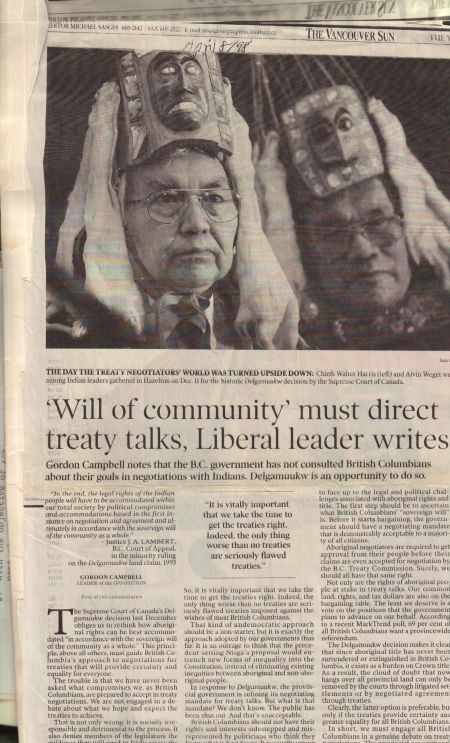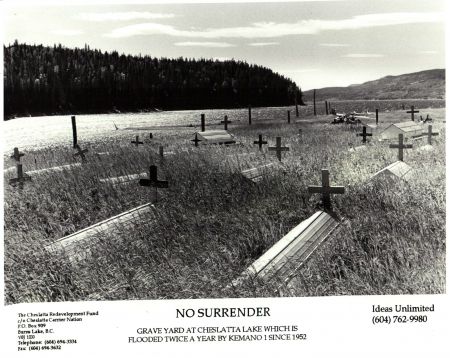STORY about Indigenous posted on November 8, 2015 by Kerry Coast
Holy See under review by UN Committee for Elimination of Racial Discrimination
“Papal Bulls were the first extinguishment policy.” – Pau Tuc La Simc, Líl’wat

Alvin Weget, hereditary Gitksan chief who had to testify in a Canadian court to the social, economic and political realities of his nation in Delgamuukw.
Also posted by Kerry Coast:
Also in Indigenous:
The Vatican does not appear to see itself as culpable of any kind of racial discrimination. This is according to its report to the UN treaty body, and apparently because all people are welcome to join the Catholic Church and worship their One True God.
The Holy See, governmental representative body of the Catholic city-state, is under review by the UNCERD this month. The list of issues presented to the city-state by the Committee, however, only pertain to questions of racial discrimination within the church community itself, however.
In its present report to the UN Committee for Elimination of Racial Discrimination (UNCERD), the Holy See attaches the statement of Pope John Paul II on World Peace Day, 1997: "One cannot remain a prisoner of the past: individuals and peoples need a sort of ‘healing of memories’.”
Amid many more anecdotes going to equality among people to become Catholic, the late Pope’s recommendation for historical revisionism does not convince. The rights of Non-Christian Peoples do not, according to the charter of the United Nations, include “that barbarous nations be overthrown and brought to the faith itself” – as the Inter Caetera Papal Bull of 1493, by the Vatican, upheld today by the successor states to European imperialism in the Americas, instructs.
A submission by the Apache-Ndé-Nneé Working Group to the UN review of the Vatican’s compliance with the Convention for the Elimination of all forms of Racial Discrimination recommends analysis of the city-state at every article of the Convention.
The unholy link between church and imperialist state; between church and Christian conqueror, begs for exposure and legally binding attention today. The list of issues presented to the city-state by the Committee, however, only pertain to questions of racial discrimination within the church community itself, however.
Truth Commission
Peoples throughout the Americas have been calling for an international Truth Commission to formally hear their very extensive complaints against the Catholic Church and its fount – the Vatican. The Pope has, over centuries, justified the overthrow of Indigenous Peoples and the creation of extortionist states in their stead.
In a shadow report to the UNCERD this month, the Apache-Ndé-Nneé Working Group has repeated that call for a Truth Commission in their submission to the UN treaty body review process:
The Apache-Ndé-Nneé Working Group Shadow Report in its entirety makes the case for, amongst other things, the need for a Truth Commission regarding the Holy See and the Inter Caetera and the Apache-Ndé-Nneé and Indigenous Peoples, reparations and changes in related and resulting laws and policies regarding Indigenous territories and sovereignty therein, and a legally-formal and public rescinding by the Holy See of the Inter Caetera and its legal, political, spiritual and territorial legacies.
The past and ongoing effects, as exhibited in the Apache-Ndé-Nneé Working Group Shadow Report, of crimes against humanity and genocide, including cultural genocide, ethnocide, ecocide, and environmental racism12 as experienced by the Apache-Ndé-Nneé and that result from the legacy of the Inter Caetera must be addressed legally and formally, and with proper and Indigenous FPIC [Free Prior and Informed Consent]-based redress and remedy, including but not limited to in the context of the option of a full and formal Truth Commission.
Formal and direct legal codification must be made that denounces and rescinds all subsequent and related regional, national and international legal decisions, treaties and codifications based on and developed from the inherent racism against Indigenous Peoples of the Inter Caetera.
Inter Caetera was – or should have been – nullified by a succeeding Papal Bull, Sublimus Dei, 1537. The later Papal directive recognized Indigenous Peoples’ rights to their identity, sovereignty and lands, but the Vatican has done nothing to expose or condemn European imperial extravagance in ignoring those instructions.
That was entirely political – forwards and backwards. In the early 16th century France was petitioning the Pope openly to recall the exclusive rights it had handed to the Catholic Monarchs beyond the Tordesillas Line, i.e., everything west of the known continents of Europe and Africa, in 1493. France was broke and needed gold – from America. Spain and Portugal openly defied the new Bull that recognized the international rights of Indigenous Peoples and, ironically, opened the west to other European discovery. And the Vatican neither disciplined the Iberians nor enforced the humanitarian provisions of Dei along with the licenses of "Discovery" it extended to other Christian European powers.
The stated religious purpose to the Vatican’s licenses, to collect lost souls into the beneficient fold of God, lost any shred of credibility. However, North and South American states rely to this day on Christendom’s[i] prerogative to reduce, confine and oppress non-Christian peoples.
Many Indigenous scholars and law keepers who are making the case for formal decolonization of their territories in North America point to the 1823 US Supreme Court ruling in Johnson vs. M’Intosh – where Chief Justice Marshall confirmed his country's reliance on the Pope’s permissions of “Discovery.” That case contributes meaningfully to the precedent basis for American Indian law and the Indian Act in Canada today. That case justified the infringement of Indigenous Peoples’ rights by recognizing the superiority of Christians over “heathens.”
The Church
The Catholic Church claims 1.2 billion members worldwide. The Vatican, via the Holy See, has participated as a permanent observer state of the United Nations since 1964. The Holy See has ratified many UN Conventions, bringing it under the jurisdiction of UN treaty bodies to examine the Holy See’s compliance.
According to the website of the Holy See Mission to the United Nations in New York, their purpose is “directed towards attaining freedom for every believer”. This statement must be illuminating: the Vatican’s governance does not seem to be describing their intentions to uphold the human rights of every person – just every Catholic. This preference for Catholic life is entrenched in every statement the Holy See or its representatives make in United Nations forums.
So what does this organization refer to when it declares that the Vatican’s representative to the UN is at their service to “communicate the centuries’ experience of the Catholic Church to humanity, and places this experience at the disposal of the United Nations to assist it in its realization of peace, justice, human dignity and humanitarian cooperation and assistance”?
These centuries of experience are nakedly bent on the peace of the church, at the expense of the peoples and lands where it has invaded and taken root.
The value of lands and stolen treasure which the Catholic Church has received from peoples in the Americas alone, perhaps by conversion / coercion, is in the trillions of dollars.
The Holy See’s political purpose is laid down clearly: this organization is interested in rights which “permit men and women to pursue their journey of faith and their search for God in this world.”
But other races have other Gods.
Racial Discrimination and Religious Persecution
Canada has always relied on the theory of Christian supremacy. Modern day Christian pastors seek to empower churches in small Indian Reserve communities, insisting that Jesus Christ is the only saviour provided by the Creator. Canada’s quasi-legal system, which ignores constitutional law going to the need for treaty before settlement, leans on broken legal paraphernalia attributed to the Vatican and its permissive attitude to Christian forces of colonization, including the 1823 Johnson v. M’Intosh mentioned above.
These claims are rejected by many nations, among them the Líl’wat, who offer the following insight:
“All spiritual beliefs are equal and one can’t be subordinated to another. At that moment, when a person subordinates another, they are not acting out of their spirituality.”
“Nobody can come in between your relationship with the Great Creator or God, but the priests and nuns did that. They interfered in that relationship our ancestors had with our Great Creator.” – Martina Pierre
“Papal Bulls were the first extinguishment policy.” – James Louie
“We have our own spiritual life.” – Fay Nelson
“They were praying (in the Christian tradition) because of fear, all the time. When 90% of the people are dying all around you, you will try anything. We saw that, the old people praying all the time.” – Lloyd Williams
The use of Catholic priests to oversee destruction of Indigenous ceremonial items, or their purchase and removal, is unconscionable. This use and abuse is culpable uder the Convention for the Elimination of Racial Discrimination.
Catholic Missionaries' complicity with the Indian Reserve system in Canada, and government funded Indian Residential Schools, and complicity with criminalization of Indigenous Peoples under the Indian Act, were all criminal acts. These crimes reach back to the Vatican, or the Holy See.
In fact, pivotal acts of colonization in the Americas were carried out by the Church. While Missionaries extended the reach of the Church they protected and aided settlers, domination by foreign state powers, and extortion.
A United Nations committee, or treaty body, has the power to make recommendations which constitute findings during their review of members of the United Nations. If the UNCERD, for example, finds that there are questions going to racial discrimination on the part of the Holy See, it may, for example, recommend a Truth Commission.
Follow the reports by and recommendations delivered to the Holy See by checking the OHCHR website for CERD's 88th session.
[i] In his 2008 book Pagans in the Promised Land, Shawnee/Lenape historian Steven T. Newcomb distinguishes Christendom from Christianity – the former being essentially the amalgamation of churches and states, secular princes and priestly authorities in the doctrine of divine right of kings and popes. Christianity refers to the belief system of the church.
The site for the Vancouver local of The Media Co-op has been archived and will no longer be updated. Please visit the main Media Co-op website to learn more about the organization.
